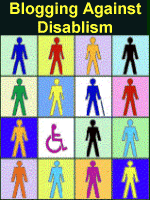 It’s funny, how things tend to work out. For example, I signed up to write on Blogging Against Disablism Day, which is today (May 1st), prior to rescheduling my doc appointment, which was also today. And seeing my doc was largely to make sure my body is still tolerating my pain management regime, and to talk about changing things up a bit – I’ve added naproxin twice daily to my “diet”, in an effort to drop back, one hopes, on the prescriptions.
It’s funny, how things tend to work out. For example, I signed up to write on Blogging Against Disablism Day, which is today (May 1st), prior to rescheduling my doc appointment, which was also today. And seeing my doc was largely to make sure my body is still tolerating my pain management regime, and to talk about changing things up a bit – I’ve added naproxin twice daily to my “diet”, in an effort to drop back, one hopes, on the prescriptions.
But prescriptions aren’t visible. I can, typically, hide the fact that I have a disability – I am one of the many, the invisibly disabled. For those just joining, I have chronic pain (complex regional pain syndrome, or reflex sympathetic dystrophy, depending on where you live in the world) in my right arm, from fingertips to the bottom of my shoulder, as well as in my left hand. The CRPS is augmented by often severe neuropathy. But if you look at me, I appear normal. It is a great, secret weapon of mine, something I can pull out in a class on disability, when someone – and there is always someone – says something stupid, like if you can’t survive in the jungle with tigers, then you’re disabled and maybe it wouldn’t be a bad thing to take that disability and remove it. Because when people think of disability, they think of crippling, visually horrible, painful, early death illnesses, or something they cannot imagine living with, like being deaf or blind. They never stop to think beyond stereotype.
And I never have to live with the stereotype. I can decide if I want someone to know I have a medical condition that limits my life, that I live in pain every single day, and the difference for me is how much pain, not whether I have pain. I think I have had maybe three or four pain-free days since being diagnosed in 2004. But if I want to, I can hide it as just being tired, or sore, or not sleeping well the night before.
Today, that changed a bit, and I spent the day feeling supremely self conscious. My doctor gave me a few samples of lidoderm, a topical lidocaine patch that can be cut to shape and applied to areas suffering topical, neuropathic pain. Which I deal with on a daily basis, and she suggested I give these a shake and see if they help – especially at periods like now, when I should be writing several papers and spending most of my time typing and writing, instead of laying on a heating pad. I’m always game to try new things, so we sliced the patches up, slapped one on my lower shoulder blade, and the other immediately under my right elbow.
While I had long sleeves on, it was warm today and I had the sleeves pushed up enough that the patch was visible. Running errands after the appointment, I felt like people were staring – something I chalked up to my own discomfort, until several people asked what I was wearing, if they were the heat patches or something else. Once I got to the hospital, the people around me knew what I was wearing, and several folks I knew stopped to ask why I was wearing the lidoderm patch.
By the time I got to work, I had pulled my sleeves down.
I am a bit of a control freak, and one of the things I desperately like to control is what people know about me (which might sound funny coming from someone who blogs as much, and in as many places, as I do, but believe me, I control what I blog about, too). While I still have a choice as to whether or not I want to reveal that I am not fully able-bodied, it’s a “choice” that means I can have a bit more pain relief, or not. I have to choose how I want people to see me, and while I realize that I might be considered lucky, by many, to have the choice, to be able to pass, in some ways, I wish I didn’t have the choice. I wish I didn’t have to weigh which is more important to me, visible disability or fake ableism, or that it was even a question.


 Many years ago,
Many years ago,  My good friend and ex-officemate (so you know he’s got to have high tolerance levels – we shared a very close, confined space for well over a year, and instead of killing each other, went out of our way to work at the same time so we could do things like watch CSI and BSG whilst fighting our respective platforms) sent me what at first seemed like an utterly random text message last night – until I
My good friend and ex-officemate (so you know he’s got to have high tolerance levels – we shared a very close, confined space for well over a year, and instead of killing each other, went out of our way to work at the same time so we could do things like watch CSI and BSG whilst fighting our respective platforms) sent me what at first seemed like an utterly random text message last night – until I